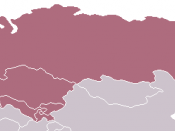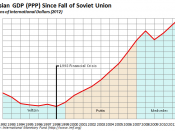Sir Thomas More's Utopia
As clearly defined by the title, Sir Thomas More strives to lay the plans for a perfect society through equality by economic, political, and social means. The idea he presents as his strongest point is the concept of the dissolution of private property. Yet while his concepts are nearly perfect in theory, there is much question to their validity in reality.
Sir Thomas More suggests that without private property, economic equality is achieved with his statement "As long as private property remains, the largest and far the best part of mankind will be oppressed with an inescapable load of cares and anxieties." In words, his plan sounds like it would do away with the misery brought about by the lust and greed for wealth, yet fortunately the downfall of communist Russia has provided a clear example for which we are able to view its folly.
When the incentive of gaining riches and wealth through hard work and entrepreneurial experiments goes away, so does the productivity of a society's economy. When one knows that their wages will remain constant despite their input of effort and time, they will be subject to laziness and a lack of hope for a better tomorrow. Yet in America, there always inlays the opportunity of a mere waiter making minimum wage advancing to own the entire chain of restaurants. American ingenuity is spawned by such principles as these. Much the same, Political equality elusively seems completely attained through More's plan of action.
When Sir Thomas More stated how the lack of private property would alleviate the political problems ever-present in any human society, he appears to make a firm point. In today's politics we are governed by men and women from the upper class of society, just as we...


